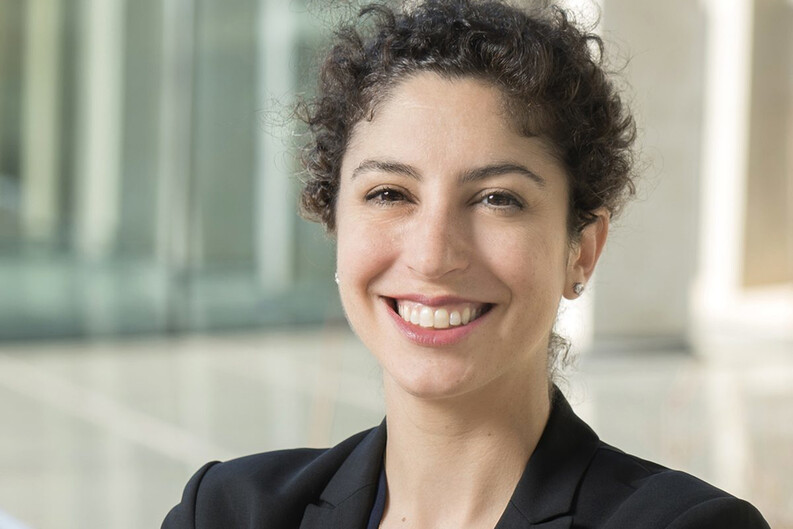Rebecca Wexler ’16, Scholar of Secrecy and Evidence, Tells How MFIA Clinic Shaped Her Career

How and when is information hidden and exposed in courts? Who has the resources to keep secrets and whose actions are laid bare for all to see? How do technologies shape our knowledge about the world? In an interdisciplinary career, Rebecca Wexler ’16 has considered these questions both academically and practically, as a freelance documentary filmmaker, a Yale Law School student in the Media Freedom and Information Access Clinic4, and in her current position as an Assistant Professor of Law at the University of California Berkeley School of Law.
Wexler’s interest in questions of evidence, neutrality, and objectivity was first sparked during her time as an undergraduate at Harvard College, where she studied philosophy of science and documentary film. After completing a master’s as a Gates scholar at Cambridge University, Wexler went to work in the documentary film industry, making films for national broadcast television, museums, and education.
“I was fascinated by debates about what it means to accurately portray the world in a documentary,” Wexler recalls. “Would it be better to do cinéma vérité with no interference? Is a re-enactment OK? What kind of retouching is appropriate?”
Even as she has changed careers, the same fundamental questions continue to animate Wexler’s work: what can we know about the world and what factors shape that knowledge?
In 2009, after several years of freelancing, Wexler co-founded the Visual Law Project at Yale Law School, where she taught law students to make documentary films. The school offered her an appointment as a fellow at the Information Society Project5 (ISP). This experience was transformative.
“Until then, I didn’t make films because I necessarily cared about an issue; I grew to care about the issue once I was hired to work on a film about it,” Wexler remembers. “For my students it was the opposite: they cared about something in the world, which is why they wanted to make a film about it.”
Inspired, Wexler decided to apply to law school.
When Wexler started at Yale Law School, she knew she wanted to be a legal scholar. But it hadn’t occurred to her that she might also pursue litigation or legal practice until she enrolled in the MFIA Clinic. At the clinic she worked on a docket that focused on freedom of information. It was while working on one of these cases that Wexler had her first experience of oral argument, at the U.S. District Court for the Southern District of New York.
“I was intrigued by the idea that you could write words on a page and file them in court, and they could become part of a judicial opinion that would have the force of law,” Wexler notes. “But I never imagined until I joined MFIA that I could be the one to write those words and argue them in court.”
The MFIA Clinic entirely transformed my idea of who I was. Thanks to the clinic, today I am both a scholar and a practicing lawyer.”
—Rebecca Wexler ’16
With a newly kindled interest in litigation, Wexler spent a year as a Yale public interest fellow at the Legal Aid Society’s Criminal Defence Practice in New York City. She also clerked for Judge Pierre N. Leval at the Second Circuit and for Judge Katherine Polk Failla in the Southern District of New York. She has continued to do pro bono litigation alongside her academic work.
Today, the issues Wexler worked on as a student in the MFIA clinic — questions around freedom of information and constitutional access — have found their way into her scholarship.
In “Life, Liberty, and Trade Secrets6,” a 2018 article for the Stanford Law Review, Wexler tackled intellectual property in the criminal justice system. With the automation of justice systems, today computers make important case decisions in criminal law. But information about how such systems work is often kept under wraps by their developers, citing the intellectual property law of trade secrets. Wexler’s article criticizes these trade secrets provisions, arguing that they are harmful to defendants.
In general, Wexler observes, the introduction of new technologies into criminal law is exacerbating asymmetries of power. Law enforcement, which tries to prove guilt, is significantly better organized and better resourced than criminal defence investigators who are tasked with proving innocence, she notes. New technologies are skewing matters even further, she adds, leading to an imbalance between evidence of guilt and evidence of innocence.
All of this raises deeper concerns about the adversarial truth-seeking process, which the U.S. legal system considers to be the best approach to accurate fact finding.
“What’s so fascinating to me about the secrecy rules in court is that they unapologetically impede the adversary ideal,” Wexler says. “If only one side has access to information and the other doesn’t, or if one side is way more well-resourced to investigate than the other side, then the adversary promise doesn’t work and you end up with distorted results.”
These questions continue in the classroom, where Wexler teaches classes on evidence and secrecy in the courts. At Berkeley, Wexler also co-directs the Center for Law and Technology.
Beyond the university, Wexler has applied her scholarship in engagements with the legislative and executive branches of the government. Last year, she took a semester off from Berkeley to take on a role as a tech policy advisor7 at the White House Office of Science and Technology Policy helping implement President Biden’s Executive Order on advancing effective, accountable policing. Earlier this year, she testified before the U.S. Senate Judiciary Committee’s Subcommittee8 on Criminal Justice and Counterterrorism on the use of artificial intelligence in criminal investigations and prosecutions.
“The MFIA Clinic entirely transformed my idea of who I was,” Wexler says. “Thanks to the clinic, today I am both a scholar and a practicing lawyer.”


